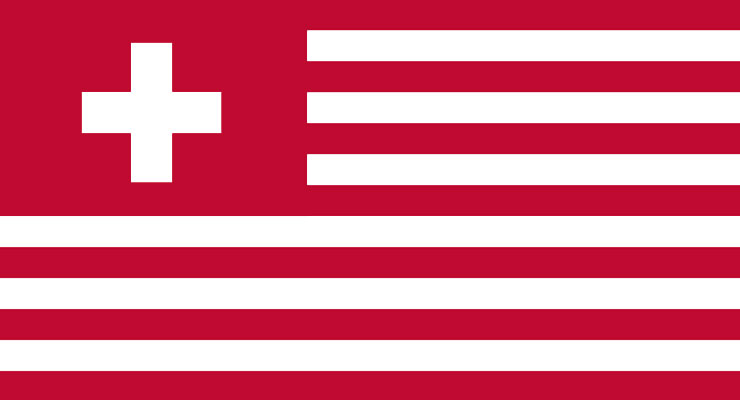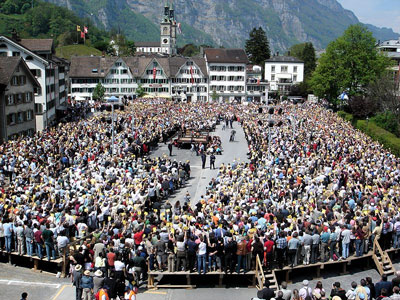
Following the chaos and questioning that the 2016 Presidential election produced, is it time that the United States looks for another model of democracy? The American presidential election system has been particularly mired in controversy since 2016 when President Donald Trump defeated Democratic Party challenger Hillary Clinton not by popular vote, but the electoral college.
President Trump defeated Clinton, 304 to 227 to become the 45th President of the United States in November of 2016. Clinton won the popular vote 65,845,063 to 62,980,160 but since the American presidential election is determined by the Electoral College, she lost, leaving many to wonder if America’s democracy is currently in the right form or should it be modeled on a different system – like the Swiss model of direct democracy.
A very Swiss democracy
The Swiss model is highly regarded as one of the best models of democracy in the Western world. It is a highly unusual system where citizens themselves go to the polls and directly vote on referendums, needing a majority of the vote to approve initiatives.
In order for a referendum to become law in Switzerland, the citizens have three options to bring a referendum to vote: mandatory, popular initiative, and optional. Each of the three options can lead to changes in the Swiss constitution and/or can lead to an actual referendum becoming law. For the referendum to pass, a majority of citizens in a Canton (Swiss state) must vote in favor of it.

But with all the praise of the Swiss system, there are some who see serious flaws. Tobias Montag who is a political scientist at the Konrad Adenauer Foundation is one who disagree with the model. According to Montag, “in practice these direct democracy maneuvers often lead to great polarization, and that’s not very helpful to democracy.”
Some examples of referendums that have fed polarization include a 2009 proposed ban to restrict minarets on mosques that received majority support. Another example of a referendum leading to polarization is a 2014 referendum which limited the number of migrants that Switzerland would accept into the country – a direct response to the Europe-wide migrant crisis. Some viewed these actions as controversial because the EU that surrounds Switzerland has represented itself as a free and unrestricted, welcoming community.
“They often use direct voting to make their politics look legitimate,” Montag continued expressing his concern over the number of authoritarian regimes that have used the referendum method to legitimize their regimes.
As Montag explained, referendums can also used by populists to spread controversial opinions. The populist movement that has spread throughout the European continent in the past five years resulted in several right-wing governments being elected. This has largely been in response to the economic crisis of 2009 and the arrival of the migrant crisis from Africa and the Middle East.
Reflections on the Swiss model from America
The referendum model, however, is in actuality more of a direct model then what we have here in America where unpopular governments can pass laws even when the majority has all three branches of government.
Even though Switzerland has representatives elected to government, private citizens can start referendums themselves if they find enough support. This is in contrast to America where the President, Representatives and Senators are elected but citizens have no method to pass referendums at the national level. State level referendums do exist in some states and some states even have systems that allow the recall of politicians through popular referendum.
“The most important thing about decisions is not how fast they’re made, but how good they are,” Montag continued. He pointed to the fact that some bad laws have been made through the referendum process even though it has been looked at as one of the most democratic systems in the Western world.
With all the talk of the referendum method used in Switzerland, one must wonder if it be possible to set up a similar system at the federal level in the United States. Switzerland has 26 cantons in the country compared to 50 states in the much more populous United States, so it would be extremely difficult to even set up a system where everyone would be able to participate in a national referendum system. In my opinion, even though democracy in the United States isn’t perfect and needs many changes, the representative model is probably the best form of government for a country of our size and influence.
Links to Sources:
Ad Anderson says
Societies that are not polarised by issues far, far more than Switzerland ever has been, exist under party “democracies” all over the world. The fact that the Swiss citizens are actually empowered to effect change in society directly is the very thing that makes Switzerland arguably the only functioning real democratic state in existence today. Democracy is supposed to be based upon a few reliable constants in human society; that the majority will almost always choose a peaceful and productive outcome if possible, that a society of empowered citizens promotes a sense of belonging, interreliance and of civic duty: all are responsible for the greater good, and that a contented majority is a good definition of a successful society. Personal choice is just an added bonus, not the central issue. That issue was originally to prevent individuals and factions of agenda-minded and powerful persons from taking control of the resources rightly belonging to the people, so tyrants and….political parties. They were called factions by historians but yeah, they were the Tories and Whigs, GOP and dems, the liberal and the conservative of ancient times. Somehow, and Solon and Cleisthenes must be tired of rolling in their graves, we have managed to evolve a political system that calls itself by the name of a system invented to prevent what we have evolved. Democratyranny.
But the Swiss, the internet and perhaps even more so the irony, have left us with a very simple escape route to an actual democracy. Legally speaking the ultimate legislative power of a democratic state is the majority will of its citizens. This is exercised by our selection of those who, legally speaking, we choose as our representatives in parliament/congress. If we were able to elect an independent representative who will take on a contractual obligation to consult their electorate in parliamentary ballots, we suddenly get one electorate practising actual, direct democracy. A representative who is not free to vote on their own provides no traction for lobbyists, for influence or for corruption of the vote. If they are given a staff, who are contractually obliged to be objective, to run the electorates’ online information and voting site…the steps are simple, few and legal right now. I envisage an app a lot like reddit, but where content comes from the information provided to the rep and from expert analysis, so scientific or otherwise qualified sources and a composition from those whom the legislation will directly effect negatively. Citizens would be able to read either a synopsis of the material or go into details and discussion, then cast one vote on that issue. People would be free to comment but not to post new material on the site, so limiting the fake news phenomenon. Those who feel too busy to invest enough time in the process could nominate a fellow citizen whose opinion they trust enough to follow in the vote.
And we’d be responsible for fixing our own problems with our own resources and energies. Sounds pretty damn good to me, and it’s what the word means; democracy. Majority rule of all the people, all the time.